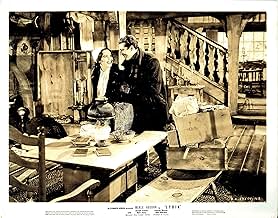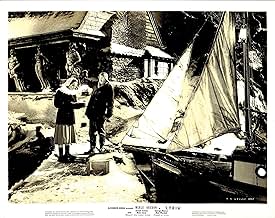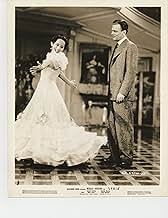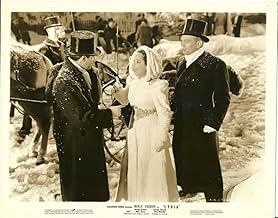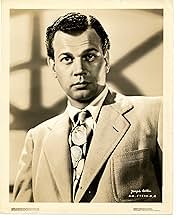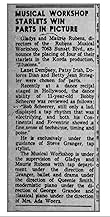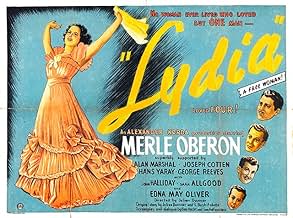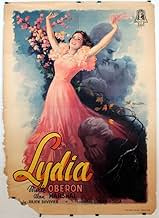Une vieille femme riche qui ne s'est jamais mariée, est invitée par un homme, le Dr Michael Fitzpatrick, pour une réunion avec les hommes qui ont été dans sa vie pour se remémorer l'époque o... Tout lireUne vieille femme riche qui ne s'est jamais mariée, est invitée par un homme, le Dr Michael Fitzpatrick, pour une réunion avec les hommes qui ont été dans sa vie pour se remémorer l'époque où ils étaient jeunes et la courtisaient.Une vieille femme riche qui ne s'est jamais mariée, est invitée par un homme, le Dr Michael Fitzpatrick, pour une réunion avec les hommes qui ont été dans sa vie pour se remémorer l'époque où ils étaient jeunes et la courtisaient.
- Nommé pour 1 oscar
- 5 victoires et 1 nomination au total
Hans Jaray
- Frank
- (as Hans Yaray)
Evelyn Beresford
- Sarah's Guest
- (uncredited)
Tyler Brooke
- Vaudeville Singer
- (uncredited)
Frank Conlan
- Old Ned
- (uncredited)
Harry Cording
- Hotel House Detective
- (uncredited)
Hal K. Dawson
- Hotel Desk Clerk
- (uncredited)
Jack Deery
- Ball Guest
- (uncredited)
Paul Everton
- Sarah's Guest
- (uncredited)
Jesse Graves
- Michael's Servant
- (uncredited)
Bobbie Hale
- Bar Patron
- (uncredited)
Gertrude Hoffman
- Mrs. Fairfield
- (uncredited)
Avis en vedette
After dedicating a home for blind and crippled children, doddering old Merle Oberon (as Lydia MacMillan), who never married, attends a surprise gathering of her old boyfriends. The reunion is arranged by physician Joseph Cotten (as Michael Fitzpatrick). The son of Ms. Oberon's family butler, Mr. Cotten has also invited blind musician Hans Jaray (as Frank Andre) and future "Superman" George Reeves (as Bill Willard). A fourth beau, seafaring adventurer Alan Marshal (as Richard Mason) may or may not appear. He is one of the story's mysteries, so stay tuned. Oberon and her old suitors reminisce about their romances, in flashbacks beginning in 1897, when "the prettiest girl in Boston" was a desirable young maiden...
"Lydia" is a re-make of director Julien Duvivier's "Un carnet de bal" (1937), re-fashioned entirely for star Merle Oberon by producer Alexander Korda. The original French export was a worldwide hit, with Mr. Duvivier and his remarkable original players receiving much critical acclaim. There are some significant changes in the story, but they do improve the central played by Mrs. Korda (Oberon). She is the reason for the picture, clearly. An impressive group was hired for this motion picture; their skills are intermittently evident, but the totality of the film is far too pretentious...
Watch "Lydia" for the production values and moments of perfection. You'll find much of the latter in the work of supporting actress Edna May Oliver (as Sarah "Granny" MacMillan). This was the last appearance of Ms. Oliver, a classic character actress who became the most valuable player nearly every time she appeared on screen. Oliver's character appears in the flashbacks, as Oberon's wealthy and outspoken grandmother. She complains about mysterious internal ailments, but is considered a hypochondriac. The veteran actress died in 1942, of internal ailments. In real life, Oliver passed away peacefully in her sleep. On screen, she plays her expiration scene with Shakespearian majesty. This is how it should be done.
****** Lydia (9/18/41) Julien Duvivier ~ Merle Oberon, Joseph Cotten, Edna May Oliver, Alan Marshal
"Lydia" is a re-make of director Julien Duvivier's "Un carnet de bal" (1937), re-fashioned entirely for star Merle Oberon by producer Alexander Korda. The original French export was a worldwide hit, with Mr. Duvivier and his remarkable original players receiving much critical acclaim. There are some significant changes in the story, but they do improve the central played by Mrs. Korda (Oberon). She is the reason for the picture, clearly. An impressive group was hired for this motion picture; their skills are intermittently evident, but the totality of the film is far too pretentious...
Watch "Lydia" for the production values and moments of perfection. You'll find much of the latter in the work of supporting actress Edna May Oliver (as Sarah "Granny" MacMillan). This was the last appearance of Ms. Oliver, a classic character actress who became the most valuable player nearly every time she appeared on screen. Oliver's character appears in the flashbacks, as Oberon's wealthy and outspoken grandmother. She complains about mysterious internal ailments, but is considered a hypochondriac. The veteran actress died in 1942, of internal ailments. In real life, Oliver passed away peacefully in her sleep. On screen, she plays her expiration scene with Shakespearian majesty. This is how it should be done.
****** Lydia (9/18/41) Julien Duvivier ~ Merle Oberon, Joseph Cotten, Edna May Oliver, Alan Marshal
(1941) Lydia
ROMANTIC DRAMA
American English speaking version of the 1937 movie ""Un Carnet de Bal" co-written and directed by Julien Duvivier. Like Hitchcock rebooting "The Man Who Knew Too Much", Yasujirô Ozu and Frank Capra rebooting their movies to name a few, this is Duvivier remaking this time starring Merle Oberon as the title character, Lydia as she details and recounts four different relationships with four different men of Hans (Frank Andre), Bob (George Reeves), Richard (Alan Marshal) and Michael (Joseph Cotten) from different times starting from the year of 1897. Resorting to the conclusion that it did. I liked the unique style of this that could have had a stronger payoff.
American English speaking version of the 1937 movie ""Un Carnet de Bal" co-written and directed by Julien Duvivier. Like Hitchcock rebooting "The Man Who Knew Too Much", Yasujirô Ozu and Frank Capra rebooting their movies to name a few, this is Duvivier remaking this time starring Merle Oberon as the title character, Lydia as she details and recounts four different relationships with four different men of Hans (Frank Andre), Bob (George Reeves), Richard (Alan Marshal) and Michael (Joseph Cotten) from different times starting from the year of 1897. Resorting to the conclusion that it did. I liked the unique style of this that could have had a stronger payoff.
Here Oberon shines. The story is slight, yet gives Oberon time to revel in the Ben Hecht/Samuel Hoffenstein dialogue. Oberon plays Lydia, a woman who is searching for love. The film is framed by a reunion, with Lydia as an old woman. She is reunited with the four fellows that have chased her throughout her life. All four actors do their best with their roles, but none standout. They mostly just stare longingly at Oberon for the duration of the film. None are given much consideration or motivation other than as a lovers for Oberon can push around.
Other than Oberon, Julien Duvivier, the director, is the real star. His direction makes the most out of the simple plot. Certain scenes stick out more than others. The scene when Michael (Joseph Cotten) and Lydia run into the ball of Lydia's imagination, in slow-motion is very memorable for its dream-like feel. Also, when Frank (Hans Jaray), the blind pianist plays for the blind children, the scene is framed very beautifully. Also Miklos Rozsa's Oscar-nominated score is very good.
A pretty good drama that suffers from a necessary but clumsy framing device with the reunion, as well as a third act that doesn't jell well with the rest of the film.
Other than Oberon, Julien Duvivier, the director, is the real star. His direction makes the most out of the simple plot. Certain scenes stick out more than others. The scene when Michael (Joseph Cotten) and Lydia run into the ball of Lydia's imagination, in slow-motion is very memorable for its dream-like feel. Also, when Frank (Hans Jaray), the blind pianist plays for the blind children, the scene is framed very beautifully. Also Miklos Rozsa's Oscar-nominated score is very good.
A pretty good drama that suffers from a necessary but clumsy framing device with the reunion, as well as a third act that doesn't jell well with the rest of the film.
I do not know what would allow for such a low rating on this movie.. In my
opinion the acting is excellent . The story is a romance unequaled and
unique. The writing is as beautiful in some places as if it were poetry. I contest that this is one of my favorite movies and anyone who has loved,
loved and lost or is capable of such, should certainly watch and judge for
themselves.
An unexceptionable pleasure to the primary senses of the eyes and ears. This results from a combination of Oberon's lush eyebrows and the pillowy opulence one imagines from a director with a surname like Duvivier. The film is a 'refashioning' of his French-language 'Un Carnet De Bal' from 1937, in that the basic plot is Oberon's portmanteau recollection of 4 past loves. Cynics may understandably dive for the sick bags, but it's a pleasant surprise therefore to find that for all the typical Fox emphasis on visual scrumptiousness, this romantic opus turns out to be a narratively literate affair. It's lent considerable dramatic weight by an excellent cast, including an uncharacteristically unhistrionic Oberon.
Le saviez-vous
- AnecdotesThe poem Lydia and Bob quote at the ball is "The Night has a Thousand Eyes" by Francis William Bourdillon, a Victorian English poet (1852-1921). The text is "The night has a thousand eyes, / And the day but one; / Yet the light of the bright world dies / With the dying sun. / The mind has a thousand eyes, / And the heart but one: / Yet the light of a whole life dies / When love is done."
- GaffesAt one point, Granny mentions her intention to send Lydia to her cousin Sally's. In the next scene, Lydia refers to her cousin as "Mary".
- ConnexionsFeatured in Ladies in Black (2018)
Meilleurs choix
Connectez-vous pour évaluer et surveiller les recommandations personnalisées
- How long is Lydia?Propulsé par Alexa
Détails
- Durée1 heure 44 minutes
- Couleur
- Rapport de forme
- 1.37 : 1
Contribuer à cette page
Suggérer une modification ou ajouter du contenu manquant


